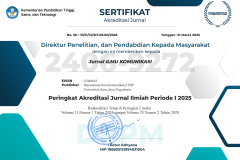Self Presentation dalam Kehidupan Virtual
DOI:
https://doi.org/10.24002/jik.v13i1.601Abstract
Abstract: The Sims 4 is a life simulation digital game, wherein the player can create and manage their virtual world. This research aims to reveal the players’ ideas in constructing their virtual world in this game. It is a qualitative research, using indepth interview to collect the data. Based on Ervin Goffman’s dramaturgy theory, “The presentation of self in everyday life”, this research concludes that The Sims 4 is played like a “real” life to create the expected self-image in the real world.Abstrak: Permainan digital The Sims 4 merupakan permainan simulasi kehidupan yang memberi kesempatan pemainnya untuk menciptakan dan mengatur dunia virtualnya. Tujuan penelitian ini adalah untuk mengungkapkan gagasan yang mendasari pemain dalam mengonstruksi dunia mereka dalam permainan digital. Penelitian ini merupakan penelitian kualitatif dengan wawancara mendalam sebagai metode pengumpulan data. Menggunakan teori dramaturgi Ervin Goffman, “The presentation of self in everyday life”, penelitian ini menyimpulkan bahwa permainan The Sims 4 dijalankan layaknya kehidupan “real” untuk menciptakan citra diri yang diharapkan di dunia nyata.
Downloads
Published
How to Cite
Issue
Section
License
Jurnal ILMU KOMUNIKASI is an academic journal. As such, it is dedicated to the open exchange of information. For this reason, JIK is freely available to individuals and institutions. Authors who publish in Jurnal ILMU KOMUNIKASI will release their articles under the Creative Commons Attribution (BY) License. This license allows anyone to copy and redistribute the article in any medium or format as well as remix, transform, and build upon the material for any purpose, even commercially as long as they credit the authors for the original creation. For details of the rights authors grants users of their work, see the "human-readable summary" of the license, with a link to the full license. (Note that "you" refers to a user, not an author, in the summary)
 This work is licensed under a Creative Commons Attribution 4.0 International License.
This work is licensed under a Creative Commons Attribution 4.0 International License.














